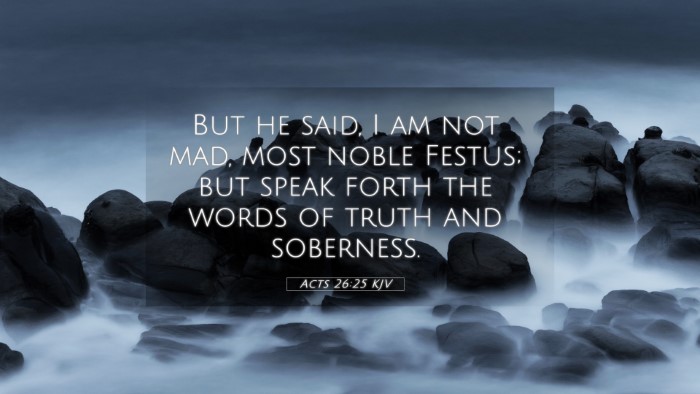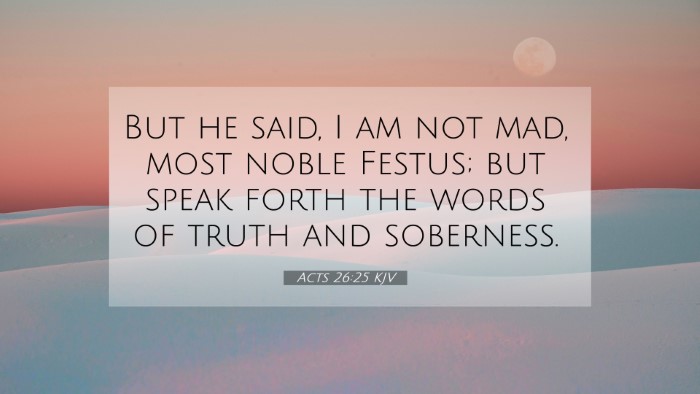Understanding Acts 26:25
Bible Verse: Acts 26:25 - "But Paul said, 'I am not mad, most noble Festus; but speak forth the words of truth and soberness.'
Summary of Meaning
This verse captures a pivotal moment during Paul’s defense before Governor Festus. Paul asserts his sanity in response to Festus' claim that he is out of his mind due to his fervent preaching about Jesus Christ and the resurrection. The statement reflects Paul's commitment to declaring the truth with seriousness and clarity, despite the skepticism he faces.
Insights from Commentaries
- Matthew Henry: Henry emphasizes that Paul's declaration of being "not mad" serves to highlight the gravity of the message he is conveying. Paul’s response underscores the importance of bearing witness to the truth of the Gospel, irrespective of the audience’s reaction.
- Albert Barnes: Barnes points out that Paul’s calm demeanor and unwavering commitment to truth resonate with the serious nature of his message. He contrasts the peace found in truth with the chaos of being seen as 'mad' by those who do not understand the spiritual realities Paul speaks of.
- Adam Clarke: Clarke analyzes the context of the statement, noting that Paul is addressing a Roman official; thus, he chooses his words carefully to establish credibility. His use of "truth and soberness" emphasizes that his message is not only rational but is rooted in solemn conviction.
Related Bible Verses
Understanding the connections between Bible verses can enrich the interpretation of Acts 26:25. Here are some cross-references that relate to this verse:
- 1 Peter 3:15: This verse encourages believers to always be ready to give a defense of their faith with gentleness and respect, akin to Paul's defense before Festus.
- John 18:37: Jesus states, "For this purpose I was born, and for this purpose I have come into the world—to bear witness to the truth." This mirrors Paul's emphasis on truth.
- 2 Timothy 1:7: Paul speaks about being given a spirit of power, love, and self-control, resonating with his sober declaration before Festus.
- Philippians 1:7: Paul's defense of the Gospel in front of authorities reflects the partnership he feels with all those who advocate for the Gospel.
- Acts 24:10-13: In a previous defense, Paul maintains his sanity and addresses the charges against him, reinforcing the themes of clarity and truthfulness.
- Acts 22:1: Paul begins his defense by addressing his audience respectfully, demonstrating his approach of sober communication.
- Luke 12:11-12: Jesus promises the Holy Spirit will speak through believers in times of trial, a comfort paralleling Paul’s situation in front of Festus.
- Romans 1:16: Paul’s boldness in declaring the Gospel reflects the power he attributes to the message of Christ, a key element in his defense.
- 1 Timothy 4:16: Paul advises Timothy to keep a close watch on his life and teaching—reflecting the seriousness with which he approaches his mission in Acts 26.
- 2 Corinthians 5:13: Paul expresses that whether they are "beside ourselves" or in their right mind, it is for God’s glory, aligning with the dynamics present in Festus’ misunderstanding.
Thematic Connections
The interaction in Acts 26:25 highlights multiple themes in Scripture, emphasizing the importance of:
- Truth: The pursuit of truth is crucial not only in Paul’s defense but as a fundamental principle in the Christian faith.
- Defending the Faith: Believers are called to present their convictions honestly and courageously, demonstrated through Paul’s experience before Festus.
- Public Perception: The challenge of being misunderstood for one’s faith is a recurring element in Scripture, as evidenced by the experiences of both Jesus and Paul.
Conclusion
Acts 26:25 serves as a powerful reminder of the importance of articulating one’s beliefs with clarity and conviction. By examining this verse alongside other Scriptures, we appreciate the depth of Paul’s experience and the continuing relevance of his message to contemporary believers.
For those exploring Bible verse cross-references and thematic Bible verse connections, utilizing tools for Bible cross-referencing enhances understanding and engagement with the Word of God.











